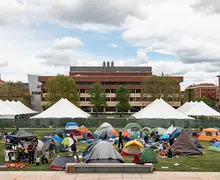Students fight for co-ed housing on South Campus
Syracuse University students Robyn Smith and Andrew Leone shared a hotel room while on Spring Break on Sanibel Island, Fla. this year. They even shared a bed during the week, although Smith said Leone stole most of the covers. But when the two returned to Syracuse to finish the semester they retreated to their separate rooms; she in Haven Hall, and he in Booth Hall.“He’s my best friend but the school says I can’t live with him because we have different genitalia,” Smith said. “I don’t care that we have different genitalia. It doesn’t really matter to me.”While it may not matter to Smith and Leone, it does to the university. When the two students petitioned SU last year to allow different-sex living options in on-campus housing they faced an uphill battle they couldn’t fight alone. A year later, the two have all but given up their fight because of all the “red tape” involved with trying to change the policy.“We got kind of discouraged when we met with the higher-ups because we saw the whole process and all we had to go through,” Leone said.Smith called the process “bureaucratic bullshit.”Dave Kohr, director of housing, agreed that the process could be lengthy, but said the students should stand up for what they believe in if they want to pursue the issue.“It could possibly happen if there’s significant support for the concept,” Kohr said. “I just don’t know that there is that support.”Smith said more than 250 students gave the idea their backing when they signed a petition in favor of male-female cohabitation. She, Leone and two other students tried to inform students through word of mouth. After this they presented their petition to the Residence Hall Association, but ended their efforts soon after because of time constraints stemming from the end of the semester workload.“It’s not that we’ve given up,” Smith said. “There are more important things in our lives like school and classes.”Smith and Leone first faced the issue during last year’s campus housing room selection. Because Leone, a psychology major, was a freshman at the time, he was contracted to live in campus housing this year. Smith, who was a sophomore, could move off-campus this year, but didn’t want to leave her friend.“Yes, I have friends who are girls but I wouldn’t like living with a girl,” said Smith, a public relations and Spanish major. “I get along better with him and honestly Andrew and I both thought we’d be able to live together on South Campus.”Smith said she thought the apartment-style housing would be ideal for male-female residency because each student has his or her own bedroom in the apartments. Married students, their spouses and children, and students who are single parents with children living with them are allowed to reside in Slocum Heights in South Campus.At Haverford College in Haverford, Penn., students have been allowed to live with members of the opposite sex for the past two years, said Robin Doan, director of student housing.The private school took slow steps to establish cohabitation in campus housing, beginning with co-ed residence halls, floors and bathrooms. In the 1980s a gay student asked Haverford’s housing committee to consider allowing opposite-sex housing in the school’s apartments.“It’s often difficult for gay students to be comfortable with students who aren’t gay,” Doan said.Smith, who is bisexual, agreed.“Often times someone who’s gay, lesbian, bisexual or transgender prefers to live with someone of the opposite sex,” she said.Leone, who is gay, said when he and Smith were petitioning the issue last year they sought the endorsement of the Pride Union, but the organization wasn’t as receptive as they hoped.“We figured with the gay angle we were taking it’d be logical to get backing from them,” Leone said. But Smith said she thinks the group might have shunned away from the issue in order to prevent publicity of the organization. “I think they didn’t want to draw attention to themselves because you don’t want to draw attention to a minority group,” Smith said.Members of Pride Union didn’t return several phone calls or an e-mail for comment.While Smith and Leone prepared their petitions for the university, they also spent time researching the successes and failures at other colleges, but found that many of the schools that offer opposite-sex living opportunities are small.“If a school is smaller, students are more vocal about something and they’re more likely to get things done,” Smith said. “They also have fewer parents to oppose the idea.”Kohr said he didn’t think parental concerns would play into the issue.“It’s pretty unusual that the university asks for parental consent,” he said. “I’m not sure if that’s an element that would come into consideration or not.”For Smith and Leone, who will live next to each other in Haven Hall in the fall semester, getting parental approval was never a concern because parents of both students gave their approval to co-ed housing. In the spring Leone will study abroad in Florence, Italy, leaving Smith to fight the battle without him. When he returns he said maybe another group of students will be busy discussing the issue.“It may be a long process,” he said, “but I’m hoping people don’t give up on it. If we can’t enjoy it now hopefully other students can in the future.”
Published on April 10, 2002 at 12:00 pm




